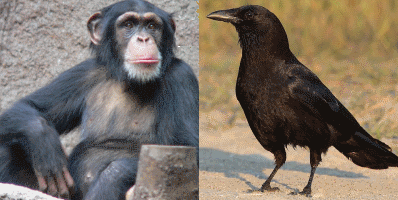Intelligence: A very general mental capability that, among other things, involves the ability to reason, plan, solve problems, think abstractly, comprehend complex ideas, learn quickly and learn from experience. It is not merely book learning, a narrow academic skill, or test-taking smarts. Rather, it reflects a broader and deeper capability for comprehending our surroundings—"catching on," "making sense" of things, or "figuring out" what to do.
- Mainstream Science on Intelligence1.
This is only one example of a definition of intelligence, but the definition itself is a subject of much discussion. Intelligence has typically been, for much of history, been applied to humans' mental processing power, but the focus is slowly shifting towards discussions about artificial intelligence. Artificial intelligence is a large umbrella term that refers, in simplest terms, to the ability of machines to be able to perceive and react to the environment – being intelligent.

Apes and crows are thought to be the smartest creatures on Earth after humans thanks to innovation abilities with tools2.
In philosophy, as opposed to computer science, the discussion revolves much around the relationship between artificial intelligence, and the mind, consciousness and human intelligence. On one hand philosophers seek to answer questions such as “In what ways can a machine have a mind similar to the human mind? Can it have consciousness?”; “What is the difference between a human brain and a computer?”; “Are there problems that machines will never be able to solve that only humans can solve?”; etc. On the other hand, some philosophers will work to establish concepts surrounding the very idea of artificial intelligence itself such as “AI is not possible.”; “AI is not moral.”; etc.
Furthermore, this topic can be expanded to consider topics such as a machine's ability to have emotions, a soul, self-awareness, and morality. Searle, Hubert Dreyfus, and Alan Turing are prominent philosophers on this topic.
References:
1. Gottfredson, Linda S. (1997). "Mainstream Science on Intelligence (editorial)". Intelligence 24: 13–23.ISSN 0160-2896.
2. Roger Highfield (2008). Crows may be smarter than apes. [ONLINE] Available at: http://www.telegraph.co.uk/science/science-news/3351960/Crows-may-be-smarter-than-apes.html. [Last Accessed 5/3/2014].
© BrainMass Inc. brainmass.com June 30, 2024, 9:26 am ad1c9bdddf